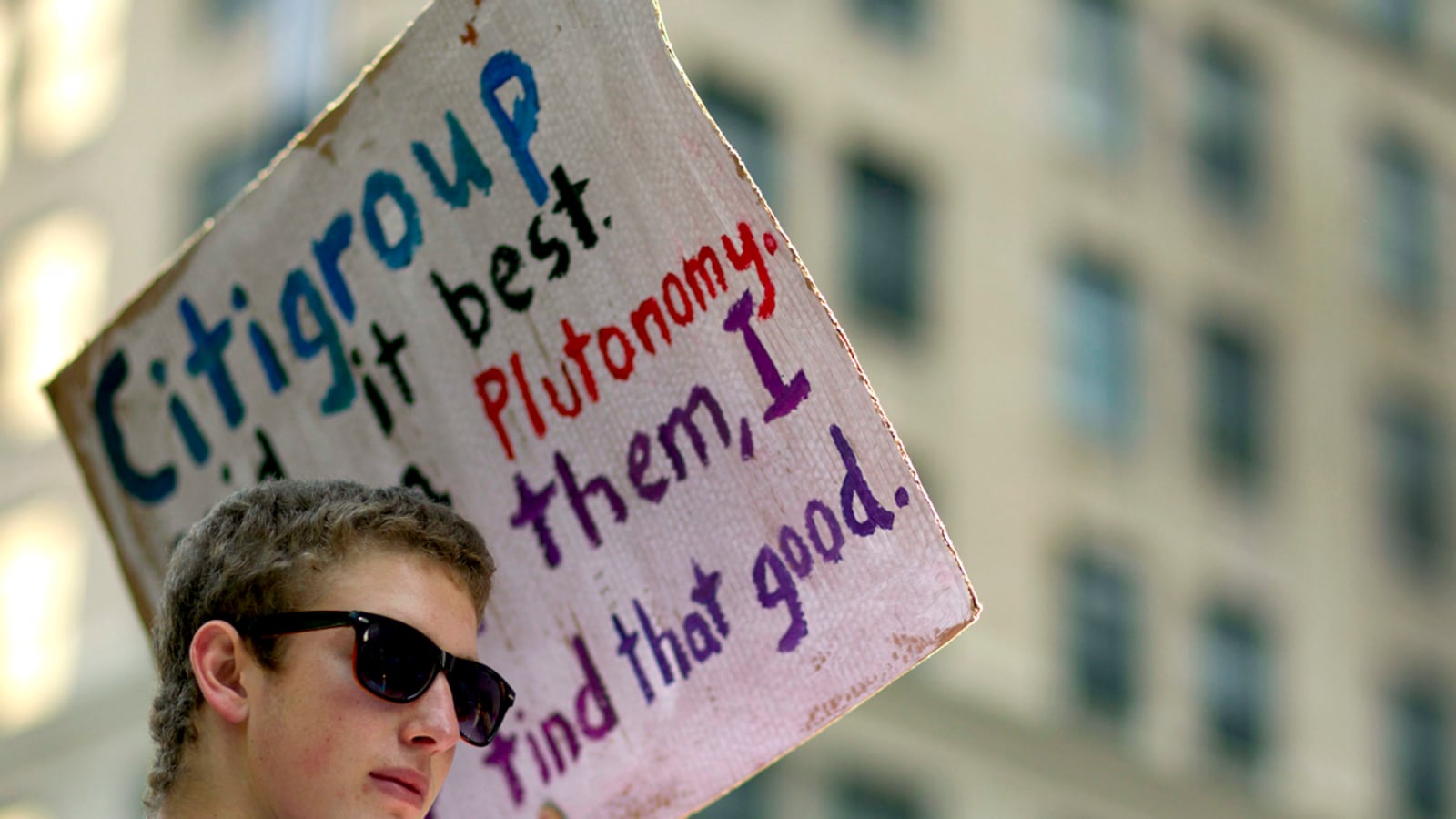After years when young Americans yearned only to be occupied on Wall Street, suddenly they have taken to occupying it. It’s easy to scoff at this phenomenon. I know, because I have.
This is certainly not America’s answer to the Arab Spring—the Bobo Fall perhaps, unmistakably both bohemian and bourgeois. But it’s still worth taking seriously. What is it that makes evidently educated young people yearn to adopt leftist positions that are eerily reminiscent of the ones their parents adopted in 1968?
Check out the protesters’ website, which on Monday featured a speech by Slovenian critical theorist Slavoj Žižek. At first I thought this must be some kind of parody, but no, he really exists—red T-shirt, Krugman beard, and all: “The only sense in which we are communists is that we care for the commons. The commons of nature. The commons of what is privatized by intellectual property. The commons of biogenetics. For this and only for this we should fight.”
Yeah, man. Property is theft. Ne travaillez jamais. And all that.
There are three possible explanations for this retrogression to the language of ’68.
- Increasing inequality exemplified by Wall Street is worth protesting against.
- So is the fact that only a handful of bankers have been prosecuted for their part in the financial crisis.
- Demonstrating is way cool.

Yet if I were a young American today, occupying Wall St. would not be my objective. Just reflect for a minute on the unbridled economic mayhem that would ensue if the protesters actually succeeded. The headline “Goldman Sachs Under Control of Hip Teenage Revolutionaries” would be the last straw for an already fragile economic recovery.
Now ask yourself what the financial crisis really means for today's 15- to 24-year-olds. Not only has it raised the probability that they will be unemployed after graduation. More seriously, it has massively increased the debt that they will have to service when they do get jobs.
Never in the history of intergenerational transfers has one generation left such a mountain of IOUs to another as the baby boomers are leaving to their grandchildren.
When you do the math, there is only one logical political home for today’s teens and 20-somethings ... and that is the Tea Party. For who else is promising to slash Medicare and Social Security and keep the tax burden at its historical average?
Let’s just remind ourselves of the report of the Trustees of the Social Security and Medicare trust funds back in 2007, which projected a rise in the cost of these two programs from 7.3 percent of gross domestic product to 17.5 percent by 2030. The trustees warned that to achieve actuarial balance—in other words, solvency—for these two programs would require (for Social Security) an increase of 16 percent in payroll tax revenues or an immediate reduction in benefits of 13 percent. For Medicare we are talking a 122 percent increase in payroll taxes or a 51 percent cut in spending.
As Laurence Kotlikoff and Scott Burns pointed out in The Coming Generational Storm, by 2030 there will be twice as many retirees as there are today but only 18 percent more workers. Unless there is really radical reform of entitlement programs—especially Medicare—the next generation of American workers will be paying roughly double the taxes their parents and grandparents paid. This is what Kotlikoff and Burns mean by “fiscal child abuse.”
Of these harsh realities the occupiers of Wall Street seem blissfully unaware. Fixated on the idea that they somehow represent the 99 percent of people who scrape by on 80 percent of total income, they fail to see that the real distributional conflict of our time is not between percentiles, much less classes, but between generations. And no generation has a keener interest in slashing future spending on entitlements than today’s teens and 20-somethings.
So occupying Wall Street is not the answer to this generation’s problems. The answer is to occupy the Tea Party—and wrest it from the grumpy old men who currently run it.
Call it the Iced Tea Party.
Way cool.





